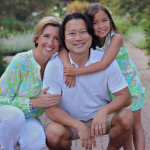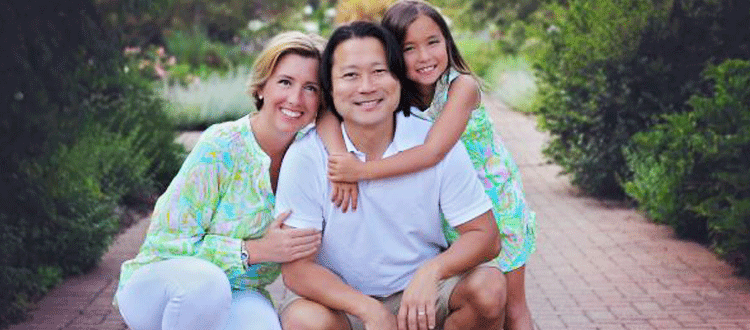A Soap Is Not A Soap, Unless It’s A Soap
 |
|
Kristine Sperling Founder, Makes 3 |
Have you ever felt like all of the stars aligned in your life and something really good happened? Has that something good ever come out of something bad? That’s the way I feel about Makes 3.
My daughter, Alice, developed asthma, eczema and allergies when she was between 2 and 3 years old and when she was 4 she became allergic to hazelnuts and later we found out her food allergies and sensitivities were extensive. This changed our lives forever. As a parent you never expect your child to get sick. You never expect them to develop conditions that could be life threatening. You never intend or prepare for your child to have problems. When any of us are preparing for the arrival of our children everything we envision involves happiness, good health and dreams coming true. No one prepares for the worst, why would you?
When Alice’s doctor told my husband, Dan, and me that after 50 years of practicing medicine he was convinced the increases in disease expression is environmental, it set in motion for us a process that would lead to starting our business. We took his advice to heart, we looked at our environment and we became committed to making the safest household we could for Alice.
The quest to find natural products for our skin is where the light bulb went off. It was our “Aha” moment. We realized that if we couldn’t find what we wanted on retailer’s shelves, that we could create it ourselves. Our “little 3” of you and me and baby Makes 3 inspires us every day to create the best products for her skin based on organic principles because we believe that soaps and bodycare products that are free from agricultural, industrial and cosmetic chemicals are better for people and better for our planet.
And so we started with soap, the first product each of us uses in the morning. How is our soap different? Did you know that not all soap is soap? Most soaps that you find at your favorite retailer are actually synthetic detergents. Most body cleansers, both liquid and solid, are actually synthetic detergent products. These detergent products became popular in the 1940s because of soap shortages caused by World War II. Synthetic detergents are mostly made of petrochemicals.
Petrochemicals are made from waste in the oil refinement process. I love how we call them by-products which sanitizes the origin of these substances. I often wonder if the oil industry didn’t find uses for the waste it produces, if all of it would be considered hazardous waste? Think about that next time you are reaching for a cheap, conventional brand.
For example, propylene, a petroleum byproduct which used to be burned off in the oil refinement process but is now captured and processed, is combined with benzene and sulphuric acid to create sulfonic acid. Sodium hydroxide is then added to the sulfonic acid to create a solid substance that behaves like soap and under FDA regulations can be called soap. People like products made with synthetic detergents because they create a lot of lather which consumers associate with cleaning power. Sodium Laureth Sulfate (SLES) is an example of a synthetic detergent which is made when coconut oil is processed with petrochemicals.
So what’s wrong with putting petrochemicals on your skin? These chemicals can be irritants at best and neurotoxins or carcinogens at worst. SLES itself has been shown to be a corrosive irritant to skin, stripping it of natural oils. It and other petrochemicals can be contaminated with ethylene oxide and 1,4 dioxane which are both “probably carcinogenic to humans,” toxic to the brain and central nervous system, kidneys, and liver, according to the CDC. 1-4 dioxane is also a leading groundwater contaminant.
Makes 3 soap is different because it is actually soap. Soap is made by combining fats or oils and an alkalai, such as sodium hydroxide, which disappears after the saponification process. The cleaning action of real soaps comes only from the alkali salts of the fatty acids in the oils which are all naturally derived and are. When organic oils are used that soap will also be free of agricultural herbicides, pesticides and insecticides. There is nothing artificial or synthetic in a real soap. Do – however – keep an eye out for brands that might be adding synthetic fragrance to real soap. To avoid synthetic additives, watch out for the term “fragrance” in the list of ingredients.
We now understand that our bodies are being changed by our environments. Since the beginning of the post-industrial, chemical age the number of unregulated chemicals we are exposed to on a daily basis has increased by the thousands. Our bodies are now burdened with hundreds of chemicals not found in nature and an increase concentration of harmful chemicals that are found in nature. Of those hundreds of chemicals that pass into our bodies, many accumulate in our body tissue, leading to disease expression.
But migrating away from harmful chemicals doesn’t have to be complicated. One new consumer decision a day can eliminate tens or hundreds of these chemicals of concern from your home. One easy choice the next time you are shopping the aisles of your grocery store can help you live in harmony and help your family do the same.
Kristine is the founder of Makes 3, Bodycare for the Whole Family. We make organic soaps and balms certified organic under the USDA National Organics Program. Makes 3 helps people create an organic life filled with happiness and wellbeing for the body, mind and spirit.



